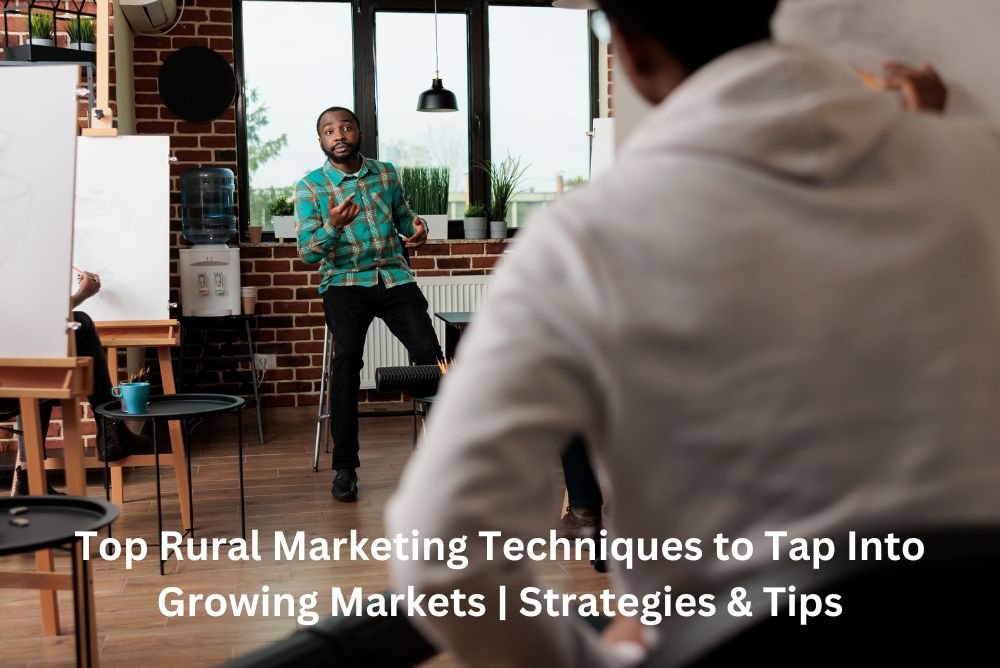Business
Top Rural Marketing Techniques to Tap Into Growing Markets | Strategies & Tips

Rural Marketing Techniques is the art and science of promoting products and services to consumers in rural areas. It plays a vital role in the global economy, particularly in countries where a significant portion of the population resides in villages and small towns. Unlike urban markets, rural markets are characterized by unique challenges, such as geographical spread, cultural diversity, and lower purchasing power. These aspects make rural marketing an exciting and dynamic field for businesses looking to expand their reach.
Why focus on rural marketing? It’s simple. Rural areas often hold untapped potential, with a growing population and increasing disposable income. Businesses that can crack the rural code can benefit immensely from this vast and diverse consumer base.
Understanding Rural Consumer Behavior
Rural consumers are distinct in their preferences and decision-making processes. Typically, they are value-conscious, preferring products that deliver quality at an affordable price. Community and family often influence their purchasing choices, and traditions play a significant role in shaping demand.
Purchasing patterns in rural areas differ significantly from urban areas. For instance, rural buyers often rely on trusted local brands or seek recommendations from neighbors or village elders. Marketers must account for these factors and craft campaigns that align with rural values.
Challenges in Rural Marketing
Rural marketing isn’t without its challenges. The first major hurdle is geographical barriers. Reaching remote villages, many of which lack proper roads, can be a logistical nightmare. Add to that the limited infrastructure—electricity and internet connectivity often remain unreliable.
Low literacy rates in rural areas also pose a challenge. This necessitates creative communication strategies that rely less on written words and more on visuals, symbols, and audio. Lastly, rural consumers may lack awareness about modern products, making it essential to focus on education and product demonstrations.
Key Strategies for Effective Rural Marketing Techniques
To succeed in rural markets, businesses must prioritize localization. Products and advertisements should resonate with the local language, culture, and traditions. Affordable pricing is another key element. Since rural consumers are highly price-sensitive, offering smaller pack sizes or entry-level variants can boost adoption.
Another important strategy is using visual storytelling. For example, advertisements featuring relatable rural scenarios, such as farming or festivals, can strike an emotional chord with the audience.
Use of Traditional Media in Rural Marketing Techniques
Traditional media remains a dominant force in rural areas. Radio, with its widespread reach, is a preferred medium for communicating with rural audiences. Similarly, television ads in regional languages are highly effective.
Local fairs, melas, and folk performances provide unique opportunities to engage directly with consumers. Marketers can also use wall paintings and posters to advertise their products in villages. These age-old methods continue to yield significant results in rural settings.
Digital Transformation in Rural Marketing
The digital revolution is making waves even in rural areas. With the increasing penetration of mobile phones and the internet, rural consumers are now more connected than ever before. Affordable smartphones and data plans have opened up new opportunities for marketers to reach these audiences digitally.
Social media platforms like Facebook and WhatsApp are particularly popular in rural regions. These platforms allow businesses to engage with consumers through local-language content, videos, and testimonials. For example, WhatsApp groups in rural communities can be leveraged for sharing product information and promotional offers.
E-commerce platforms also play a growing role. Companies like Amazon and Flipkart have tailored their delivery networks to cater to rural areas, enabling rural consumers to access a wider range of products. Digital Rural marketing Techniques campaigns targeting rural consumers often focus on simplicity and education to drive engagement.
Grassroots Engagement and Community Involvement
Building trust is crucial for success in rural markets, and one of the most effective ways to achieve this is by involving the community. Local influencers, such as village leaders, teachers, or shopkeepers, can be powerful advocates for a brand. These individuals have a strong influence on their community’s buying decisions.
Word-of-mouth rural marketing is another critical component. When a trusted individual endorses a product, it’s more likely to gain acceptance. Brands can also conduct community events, workshops, or product demonstrations to connect with rural consumers on a personal level. These initiatives foster relationships and establish credibility.
Innovative Marketing Techniques for Rural Markets
Creativity often holds the key to capturing rural audiences. Mobile vans equipped with loudspeakers, display units, and sampling stations can bring products directly to rural consumers. These vans can travel to multiple villages, hosting mini-exhibitions and product demonstrations.
Cause-based marketing is another effective technique. Aligning a brand with a social cause—such as clean drinking water, education, or women’s empowerment—resonates deeply with rural consumers. For example, a soap brand running a hygiene awareness campaign in schools can create lasting goodwill.
Gamification can also be used to engage rural audiences. Contests, lucky draws, or simple games with prizes not only attract attention but also create a fun and memorable brand experience.
Role of Government Initiatives in Rural Marketing
Government programs aimed at rural development can significantly aid rural marketing efforts. Initiatives that focus on improving infrastructure, such as roads and digital connectivity, make it easier for businesses to access remote areas.
Public-private partnerships (PPPs) often provide a win-win situation. For example, a collaboration between a brand and a government scheme promoting rural health or education can enhance outreach while contributing to societal goals. Additionally, partnering with NGOs working in rural areas can help brands tap into established networks and trust.
Leveraging Microfinance and Credit for Rural Marketing
Access to credit is often a deciding factor for rural consumers when it comes to purchasing higher-value products like farm equipment, appliances, or even packaged goods in bulk. By collaborating with microfinance institutions and rural banks, brands can offer easy financing options to consumers.
Microloans enable rural buyers to afford products they might otherwise find out of reach. For example, a two-wheeler company offering installment plans tailored to rural incomes can drive sales in this segment. Providing transparent and flexible credit options builds trust and strengthens the brand’s relationship with rural customers.
Role of Agribusiness in Rural Marketing
Agribusiness is central to rural marketing techniques , as agriculture remains the primary livelihood for rural populations. Marketing agricultural inputs like seeds, fertilizers, and machinery requires an understanding of farmers’ needs and pain points.
Direct market access initiatives—where farmers can sell their produce without intermediaries—are gaining traction. Brands that empower farmers through training programs, technology, or better market access not only boost their own sales but also contribute to rural economic development.
Optimizing the supply chain is also vital. Ensuring that agricultural products reach rural consumers quickly and efficiently improves satisfaction and builds loyalty.
Sustainability and Eco-Friendly Marketing in Rural Areas
Sustainability is becoming an important consideration in rural marketing. Promoting eco-friendly products, such as organic fertilizers or solar-powered devices, aligns well with rural consumers’ proximity to nature.
Educating rural communities about the benefits of green products and sustainable practices can drive adoption. For example, a company producing biodegradable packaging could run workshops on waste management in villages. Simple steps like using sustainable materials for product packaging or distribution can set a brand apart as environmentally responsible.
Monitoring and Evaluating Rural Marketing Success
Measuring the effectiveness of rural marketing campaigns is crucial for long-term success. Metrics such as sales growth, customer feedback, and brand awareness can provide insights into a campaign’s performance.
Feedback mechanisms, like surveys or informal discussions with local retailers, can offer valuable data. Regularly tracking these metrics allows businesses to identify areas for improvement and adjust their strategies accordingly.
Another effective approach is pilot testing campaigns in a small cluster of villages before scaling them up. This helps minimize risks and ensures better resource allocation.
Case Studies of Successful Rural Marketing Campaigns
Many brands have cracked the rural marketing code with innovative strategies. For instance, Hindustan Unilever’s “Kaan Khajura Tesan” campaign used mobile phones to deliver free entertainment content along with advertisements, targeting areas with poor TV or radio connectivity.
Similarly, Coca-Cola’s “Parivartan” initiative trained rural retailers to improve their business practices while building loyalty for the brand. Such campaigns highlight the importance of understanding rural needs and crafting tailored solutions.
Future Trends in Rural Marketing
The future of rural marketing lies in the intersection of technology and community engagement. With the rapid growth of rural entrepreneurship, more local businesses are collaborating with large brands to serve their communities.
Artificial intelligence (AI) and data analytics are also making inroads into rural marketing. Predictive analytics can help brands anticipate rural demand, while AI-powered chatbots can assist rural consumers in their local language.
As rural infrastructure continues to improve, the opportunities for marketers will only expand. Businesses that adapt to these trends and prioritize sustainability, affordability, and trust will be best positioned to thrive in this dynamic landscape.
Conclusion
Rural marketing Techniques is a field rich with opportunities, but it demands creativity, patience, and a deep understanding of rural consumers. By embracing traditional methods alongside modern innovations, businesses can tap into the vast potential of rural markets. Whether through grassroots engagement, digital tools, or sustainability-focused initiatives, the key lies in building trust and delivering value to rural communities.
FAQs
- Why is rural marketing important for businesses?
Rural marketing allows businesses to tap into a large, underserved consumer base with unique preferences and purchasing patterns. It provides opportunities for growth and brand expansion. - What are the main challenges in rural marketing?
Common challenges include geographical barriers, limited infrastructure, low literacy rates, and lack of product awareness among rural consumers. - How can digital tools improve rural marketing efforts?
Digital tools like social media, e-commerce platforms, and mobile-based campaigns enable businesses to reach rural consumers more efficiently and cost-effectively. - What role do local influencers play in rural marketing?
Local influencers, such as village leaders and shopkeepers, help build trust and credibility for a brand. Their endorsements carry significant weight in rural communities. - What are some successful examples of rural marketing campaigns?
Campaigns like Hindustan Unilever’s “Kaan Khajura Tesan” and Coca-Cola’s “Parivartan” showcase innovative approaches to reaching rural audiences effectively.
Business
Top Accounting Tips for Gold Coast Small Business Owners in 2025

The owners of small businesses in Gold Coast face various dynamics regarding their financial management. However, managing the tax process and being aware of local, state, and federal laws can make many people have an accounting nightmare. But do not despair anymore because we have provided some of the most important tax compliance tips for Gold Coast Small Business Owners that your business needs to get right when it comes to its accounts and finances.
Hire a Reliable Accountant in Gold Coast
There are various procedures recommended by the accountants in Gold Coast that can help any business organization improve the operations of its business with ease. Experience and knowledge of an accountant ensure that all your financial issues are well sorted, your taxes fulfilled, and you get advice on how to address your company’s financial issues. Also, they can be of help when it comes to matters like accounting and payroll, among others, leaving you with time to do away with things that boost the growth of the company.
Keep Your Accounts and Documents Clear
Accounts are a central aspect of any business and are significant to small businesses more so. When it comes to paperwork, it is very important to preserve all the receipts, invoices, bank statements, and any other documents of a financial nature. It will simplify your tax returns and loan applications and help you analyze the evolution of your business in the long run.
What Taxes are You Obligated to Pay?
The penalties and fines may ensue by not understanding and following the laid-down laws governing tax; therefore, the need to educate oneself on the taxes. While being a small businessperson, you may be required to pay GST and payroll tax as well as file annual returns. Some of the reasons may require the services of a tax agent in Gold Coast to assist a client in understanding the different requirements as outlined above.
Run Financial Statements from Time to Time
Another important requirement is the need to monitor your business financial performance. Knowing the balance sheet, income statement, and cash flow statement can be very useful for better decision-making in your business and for recognizing what changes can be made. Your accountant in Gold Coast is able to explain these statements and give a perception of how your business is fairing.
Plan for the Future
Financial management is therefore cyclical, and a vital segment of the cycle is planning for the future. Create a simple budget and financial forecast to track and plan your revenue and costs, set your prices, and decide whether you need to invest more in equipment or hire extra people. A good accountant can assist the business in the preparation of an effective financial plan that fits the business needs.
Ensure Tax Compliance
Just like any other small business owner, you have a responsibility to watch out for and abide by the various laws, including tax, among others. Failure to do that will attract penalties, fines, and even legal consequences that are unfavorable to the company. Your tax agent in Gold Coast can advise you on the requirements that are necessary to file and pay taxes.
Make Optimum Use of the Tax Deductions
There are thousands and thousands of tax allowances that any small business person needs to be aware of to minimize his or her tax bill and therefore boost profitability. Other subcategories of deductions are office expenses, travelling expenses, and equipment purchased, amongst others. It is recommended to consult your accountants in Gold Coast in order to find out whether you can benefit from all the mentioned deductions.
Keep Your Records Digital
Today, there is a trend of adopting the digital accounting system to handle many companies’ operations. Besides, it can save a lot of time from mistyping numbers or keying in wrong figures, and it can also enhance the way financial data is relayed to your accountant, employees, or shareholders. Digital accounting systems also enable you to retrieve relevant accounts’ information and perform analyses to identify your business’s performance.
Remember to Always Update Your Financial Systems
Depending on the scale and types of your business activities, your business is very likely to expand and transform during time and this may cause the need to update your business finance systems and procedures. I would always make sure you update your financial system and do a thorough check to make sure that you are signed up to the most relevant system on the market. Your accountants in Gold Coast can tell you in which areas you need to make changes and possible improvements to your financial systems.
Making Good Use of Professional Development Programs
To get acquainted with the recent trends in accounting and technological breakthroughs, one can participate in seminars, workshops, conferences, and so on, either physically or virtually. You will gain as much knowledge and skill about accounting as well as get to interact with other people in the field.
Conclusion
Accounting is crucial in every organization, especially so for small business people on the Gold Coast. If you hire a professional accountant, make sure that you understand your taxation needs, WOS, and financial statements. Read and learn more about taxes and other financial laws to cater to your business needs. Thus, take positive action over your finances today and position your small business for success.
Business
The Disadvantages of Electric Skillets You Need to Know

Electric skillets have gained popularity for their convenience, allowing home cooks to fry, sauté, and simmer without needing a stovetop. They promise versatility, portability, and quick cleanup, making them an attractive option for busy kitchens. However, like any appliance, electric skillets come with their own set of limitations that could affect your cooking experience.
Whether you’re a novice cook or a seasoned chef, understanding the disadvantages of electric skillets is crucial before deciding if this gadget is the right fit for your culinary needs. In this article, we’ll explore the potential drawbacks of electric skillets and why they might not always live up to the hype.
How Do Electric Skillets Work?
Electric skillets are manufactured to cook food on a flat surface using electricity. They set the desired temperature using a temperature control dial that is marked in degrees.
When the ideal temperature is reached, the temperature dial notifies you (usually with an illuminated light).
They are suitable for grilling, sautéing, and cooking. In essence, anything that can be done with a standard stovetop pan.
The Disadvantages of Electric Skillets You Need to Know
Electric skillets are a popular kitchen appliance, offering convenience, portability, and versatility. They can be a game-changer when cooking for a crowd or preparing meals quickly. However, like any kitchen gadget, electric skillets come with their own set of disadvantages that every home cook should consider. While they can simplify cooking, it’s essential to be aware of their limitations. In this article, we will explore the disadvantages of electric skillets that you need to know before adding one to your kitchen.
1. Limited Cooking Surface
One of the most significant downsides of an electric skillet is its limited cooking surface. While many models offer a decent cooking area, it may not be large enough for certain meals, especially when cooking for a large family or hosting guests. Cooking in batches can be time-consuming, and you might end up using multiple kitchen tools just to prepare a meal. If you need a larger cooking surface, a stovetop pan or a traditional skillet might be more suitable for your needs.
2. Size and Storage Issues
Electric skillets can be bulky and heavy, which can be a challenge for those with limited kitchen space. Most electric skillets require ample storage space in your cabinets or drawers, which could be a hassle, especially in smaller kitchens. The power cord also adds to the clutter, making storage a little trickier. Additionally, the weight of these appliances can make them difficult to move, particularly for people with limited mobility.
3. Uneven Heating
While many electric skillets are designed to distribute heat evenly, they may not always perform as expected. Some cheaper models may develop hot spots, causing uneven cooking. This could result in some areas being overcooked while others remain undercooked. For optimal cooking, it’s important to monitor your food closely and stir frequently, which can be more time-consuming than using a traditional skillet.
4. Not Ideal for High-Temperature Cooking
Electric skillets are typically not designed for high-heat cooking. If you’re someone who enjoys searing meat or stir-frying at high temperatures, an electric skillet may not give you the heat intensity you’re looking for. Stovetops generally provide higher heat, making them better for tasks like frying or browning. Cooking at lower temperatures can also lead to food taking longer to cook, which could be inconvenient if you’re in a rush.
5. Lack of Versatility Compared to Traditional Skillets
While electric skillets can handle a variety of cooking tasks like frying, sautéing, and simmering, they are not as versatile as traditional stovetop skillets. For instance, if you enjoy cooking with cast iron, you know the value of its ability to retain heat and produce a crisp, golden crust. Electric skillets often fall short in this area, as they lack the same heat retention properties. Moreover, their design may not be suitable for certain cooking techniques like grilling or baking.
6. Cleaning Challenges
Cleaning an electric skillet can be more challenging than cleaning a regular stovetop pan. Many electric skillets are not dishwasher safe, and washing them by hand can be tedious. The heating element and electrical components make it tricky to fully submerge the appliance in water, which might require more delicate cleaning methods. Additionally, non-stick coatings can wear off over time, making it harder to clean and potentially leading to food sticking.
7. Shorter Lifespan
Another disadvantage of electric skillets is that they generally have a shorter lifespan compared to traditional skillets. The electrical components may wear out over time, leading to malfunctions or even complete failure. While some high-quality electric skillets can last for several years, cheaper models may only last a couple of years before showing signs of wear. This means you could be looking at frequent replacements if you’re not careful with your choice of appliance.
Should I buy an electric wok or electric skillet?
When deciding between an electric wok and an electric skillet, it boils down to your cooking needs. An electric wok is perfect for those who enjoy stir-frying or cooking Asian dishes. Its high, sloped sides allow for quick, high-heat cooking, making it ideal for tossing ingredients and achieving that crispy texture.
However, it may not reach the same extreme temperatures as a traditional stovetop wok. On the other hand, an electric skillet offers versatility for everyday cooking, from frying and sautéing to simmering and even baking. It provides an even, consistent heat distribution, making it suitable for a wide range of dishes.
While the skillet’s flat surface may limit certain high-heat techniques, it is a great all-around kitchen tool. Ultimately, if you frequently cook stir-fries or need a larger cooking surface, the electric wok is the better choice; if you prefer versatility, the electric skillet might be more suitable.
FAQs on The Disadvantages of Electric Skillets
1. Are electric skillets worth the investment?
Electric skillets can be worth the investment if you need a portable cooking option for specific tasks like frying, sautéing, or simmering. However, if you have a well-equipped kitchen with a stove and other appliances, you may find that a traditional skillet offers more versatility and better long-term value.
2. Can electric skillets be used for high-heat cooking?
Electric skillets are not ideal for high-heat cooking. They are better suited for moderate cooking temperatures. For high-heat tasks like searing or stir-frying, a stovetop skillet or cast iron pan would perform better.
3. How do you clean an electric skillet?
To clean an electric skillet, you should always unplug it and let it cool down before attempting to clean it. Use a damp cloth to wipe down the surface, and avoid submerging the heating element in water. If it has a non-stick coating, use a soft sponge to avoid damaging the surface. Be sure to consult the manufacturer’s instructions for specific cleaning guidelines.
4. Can electric skillets cook all types of food?
Electric skillets are versatile and can handle many types of food, such as eggs, pancakes, stir-fry, and meats. However, they may not perform as well for certain cooking techniques like grilling, baking, or achieving high heat for crispy, browned foods.
5. How long do electric skillets last?
The lifespan of an electric skillet depends on the quality of the model and how often it’s used. On average, a well-maintained electric skillet can last for 2-5 years. However, lower-end models may show signs of wear sooner, particularly with the electrical components.
Conclusion
While electric skillets offer convenience and versatility in the kitchen, they also come with certain drawbacks. From limited cooking surfaces and uneven heating to cleaning challenges and a shorter lifespan, it’s important to weigh the disadvantages of electric skillets before making a purchase. Depending on your cooking style and needs, a traditional stovetop skillet might be a better option. However, if you’re looking for an easy-to-use appliance for specific tasks, an electric skillet could still be a worthwhile addition to your kitchen.
Business
Boost Your Online Visibility with Adsy.pw/HB5: The Ultimate Link Building and SEO Platform

In the ever-evolving digital landscape, achieving online visibility can feel like navigating a maze. Search engines constantly update their algorithms, making it challenging for businesses to stay ahead of the competition. Enter Adsy.pw/HB5, a comprehensive digital platform that has become a go-to solution for those seeking effective link building, SEO optimization, and content promotion strategies.
What is Adsy.pw HB5?
Adsy.pw HB5 is more than just a tool—it’s part of a broader ecosystem for online advertising and marketing. Designed for businesses, marketers, and SEO enthusiasts, this platform focuses on increasing online visibility by promoting websites, products, or services. Whether you’re a small business looking to establish a digital presence or a seasoned marketer refining your strategies, Adsy.pw/HB5 offers tools tailored to your needs.
Working Cycle of Adsy.pw HB5
Adsy.pw HB5 is a powerful platform designed to simplify and enhance your online marketing efforts. Whether you’re focusing on link building, SEO optimization, or content promotion, Adsy.pw HB5 streamlines the process to ensure effective results. Let’s break down how the platform works and helps users achieve their marketing goals.
- Step 1: Create Your Account
- Step 2: Define Your Marketing Goals
- Step 3: Choose a Service
- Step 4: Launch Your Campaign
- Step 5: Monitor Progress
Key Features of Adsy.pw HB5
1. Advanced Link Building Services
Link building remains one of the most critical factors in search engine optimization (SEO). Adsy.pw HB5 excels in creating high-quality backlinks that boost domain authority and improve your site’s ranking. The platform connects users with authoritative websites, ensuring the backlinks are relevant and impactful.
2. SEO Optimization Tools
Adsy.pw/HB5 offers powerful SEO tools designed to optimize your website for search engines. These tools help users analyze keywords, track rankings, and identify areas of improvement to ensure your content aligns with current SEO standards.
3. Content Promotion Strategies
Content is king, but it needs the right audience to shine. Adsy.pw HB5 provides services to amplify your content’s reach through guest posts, sponsored articles, and niche-specific promotions. This ensures your content reaches the right audience, driving traffic and engagement.
4. User-Friendly Interface
One of the standout features of Adsy.pw HB5 is its intuitive and user-friendly interface. Even beginners can easily navigate the platform, create campaigns, and monitor progress with minimal learning curve.
5. Comprehensive Analytics
Adsy.pw HB5 offers detailed analytics to track the success of your campaigns. From traffic patterns to backlink performance, the platform provides insights that empower users to refine their strategies for maximum impact.
Why Choose Adsy.pw HB5 for Your Digital Marketing Needs?
1. Boosts Website Rankings
By leveraging Adsy.pw HB5’s link-building services, users can significantly improve their website’s ranking on search engine results pages (SERPs). Higher rankings mean greater visibility and more potential customers.
2. Cost-Effective Solution
Unlike traditional advertising methods, Adsy.pw HB5 provides an affordable way to promote your website or products. With its various pricing options, businesses of all sizes can find a plan that suits their budget.
3. Saves Time and Effort
Managing SEO and content promotion manually can be time-consuming. Adsy.pw HB5 streamlines these processes, allowing users to focus on other aspects of their business while the platform handles the heavy lifting.
4. Tailored for All Niches
Whether you’re in e-commerce, technology, health, or any other industry, Adsy.pw HB5 caters to diverse niches. Its flexibility makes it a versatile tool for businesses across different sectors.
How to Get Started with Adsy.pw/HB5
Getting started with Adsy.pw HB5 is straightforward:
- Sign Up: Create an account on the Adsy.pw HB5 platform.
- Choose a Service: Select the link-building, SEO optimization, or content promotion service that suits your goals.
- Launch Your Campaign: Set your parameters, such as target audience, keywords, and preferred websites.
- Monitor Progress: Use the analytics dashboard to track your campaign’s performance and make data-driven decisions.
Pros and Cons of Adsy.pw/HB5 Explained
Like any digital platform, Adsy.pw HB5 has its strengths and weaknesses. While it offers a wide range of tools to boost online visibility, it’s important to evaluate its benefits and potential limitations before investing your time and resources. Here’s a detailed breakdown of the pros and cons of using Adsy.pw HB5.
Pros of Adsy.pw/HB5
1. Comprehensive Marketing Tools
Adsy.pw HB5 provides an all-in-one solution for link building, SEO optimization, and content promotion. This eliminates the need to juggle multiple tools, saving users time and effort.
- Example: Instead of separately sourcing guest posting opportunities or manually researching keywords, you can do everything on one platform.
2. High-Quality Backlinks
The platform specializes in creating authoritative and relevant backlinks, a cornerstone of SEO success. These backlinks help improve search engine rankings and build domain authority.
- Example: Adsy.pw HB5 connects users with niche-relevant websites that meet high domain authority criteria, ensuring quality over quantity.
3. User-Friendly Interface
Adsy.pw HB5 is designed to be intuitive, making it accessible for both beginners and experienced marketers. The dashboard is straightforward, with easy navigation to all features.
- Example: Even users without extensive technical knowledge can set up a link-building campaign in just a few clicks.
4. Customization Options
The platform allows users to tailor their campaigns based on specific goals, such as targeting certain keywords, selecting niche websites, or defining audience demographics.
- Example: You can choose to prioritize backlinks from websites within a specific industry or region for maximum relevance.
5. Data-Driven Insights
Adsy.pw HB5 offers robust analytics tools that track the performance of your campaigns. These insights help users make informed decisions and optimize their strategies over time.
- Example: Users can monitor the performance of their backlinks and identify which ones contribute the most to traffic and rankings.
6. Cost-Effective Marketing
Compared to traditional advertising methods, Adsy.pw HB5 provides affordable solutions for digital promotion. The platform offers flexible pricing plans suitable for businesses of all sizes.
- Example: Small businesses can start with lower-budget campaigns and gradually scale up as they see results.
7. Tailored for Multiple Niches
Whether you’re in e-commerce, tech, healthcare, or any other industry, Adsy.pw HB5 caters to various niches, making it versatile and adaptable.
- Example: A tech startup can use Adsy.pw HB5 to target blogs and websites in the tech space, ensuring their content reaches a relevant audience.
Cons of Adsy.pw HB5
1. Limited Free Features
While Adsy.pw HB5 offers a wide range of services, most of its advanced features are only accessible through paid plans. Free options are limited and may not be sufficient for users on tight budgets.
- Example: Basic access may not include premium backlinks or detailed analytics, requiring users to upgrade for full functionality.
2. Dependence on External Sites
The success of link-building campaigns often depends on the quality and cooperation of third-party websites. If these sites don’t meet expectations, it could affect your campaign’s performance.
- Example: If a chosen website fails to publish your guest post on time, it could delay your campaign’s progress.
3. Learning Curve for Beginners
While the interface is user-friendly, some users, particularly those new to SEO, may find it challenging to fully understand the intricacies of link building and campaign setup.
- Example: A beginner might struggle with selecting the right keywords or identifying suitable websites for backlinks without prior SEO knowledge.
4. Results Take Time
Like all SEO strategies, the results from Adsy.pw HB5’s campaigns are not instant. Building domain authority and improving rankings requires consistent effort and patience.
- Example: A campaign launched today might take weeks or months to show significant improvements in search rankings.
5. Risk of Over-Reliance on Automation
While automation is a key strength of Adsy.pw HB5, relying too heavily on it without manual oversight can lead to missed opportunities or errors in campaign customization.
- Example: Automatically selected websites for backlinks might not always align with your brand’s voice or target audience.
6. Competition in Niche Markets
In competitive industries, the impact of Adsy.pw HB5’s campaigns might be limited without additional efforts, such as creating exceptional content or running paid advertising alongside it.
- Example: A highly competitive keyword like “best digital marketing tools” may require additional investments beyond what Adsy.pw HB5 alone can offer.
7. Requires Ongoing Investment
To maintain results, you’ll need to consistently invest in campaigns. SEO is an ongoing process, and stopping your efforts might result in a decline in rankings over time.
- Example: Backlinks from older campaigns may lose value if not continuously supported by fresh content and links.
User Experience on Adsy.pw HB5: A Detailed Breakdown
User experience (UX) plays a crucial role in determining how effectively a platform helps its users achieve their goals. Adsy.pw HB5 is designed with usability in mind, offering a range of features to simplify digital marketing tasks. Here’s a detailed, point-wise analysis of what users can expect in terms of experience when using Adsy.pw HB5:
1. Intuitive and Simple Interface
2. Quick Registration and Setup
3. Clear and Transparent Campaign Setup
4. Comprehensive Analytics and Reporting
5. Customer Support and Resources
6. Campaign Flexibility
7. Affordable Pricing Structure
8. Limited Free Features
9. Time-Consuming for Complex Campaigns
10. Continuous Updates and Improvements
Challenges and Considerations
While Adsy.pw HB5 offers powerful tools, users may face challenges such as the learning curve for advanced features, dependence on external sites for link building, and the time required to see results. Additionally, its free features are limited, and complex campaigns may require significant effort to optimize effectively.
Boundless Creative Possibilities with Adsy.pw/hb5:
Adsy.pw/hb5 opens up a world of exciting creative opportunities for marketers and digital innovators. This versatile platform is designed to inspire bold campaign ideas, ranging from captivating video advertisements to immersive, interactive experiences that truly engage the audience.
What sets Adsy.pw/hb5 apart is its adaptability, offering users the freedom to experiment with fresh concepts and push the limits of conventional advertising methods. By nurturing creativity, Adsy.pw/hb5 enables businesses to stand out and thrive in the competitive digital space.
Success Stories with Adsy.pw/HB5
Many businesses have transformed their online presence using Adsy.pw HB5. From small startups gaining their first customers to established brands solidifying their authority, the platform has proven to be a game-changer in digital marketing.
Read More: Apostille vs. Notarization: What’s the Difference and Why It Matters
Conclusion
In the competitive digital space, standing out requires more than just great products or services—it demands strategic marketing. Adsy.pw HB5 provides the tools and expertise needed to boost your online visibility, drive traffic, and achieve your marketing goals. Whether you’re a novice or an expert in SEO, Adsy.pw HB5 is a reliable partner in your journey to digital success.
-

 House3 months ago
House3 months agoHow Outsourcing Helps Agencies Save Costs and Better Allocate Their Resources
-

 Business3 months ago
Business3 months agoApostille vs. Notarization: What’s the Difference and Why It Matters
-

 Business3 months ago
Business3 months agoThe Art of Ceramic Bowls: Handmade vs. Machine-Made
-
Business3 months ago
6 Key Benefits of Email Automation for Lead Nurturing
-

 Technology4 months ago
Technology4 months agoSearch Engines that Search URL and not Description | Top URL Tools
-

 Entertainment5 months ago
Entertainment5 months agoUnderstand: Post-Apocalyptic Literature Bingo: Songs of Your Decay
-
Education4 months ago
11 Important Difference Between Seasonal Work and Internship: You Should Know
-

 Other Blog4 months ago
Other Blog4 months agoWhat is the ://vital-mag.net Blog About?





